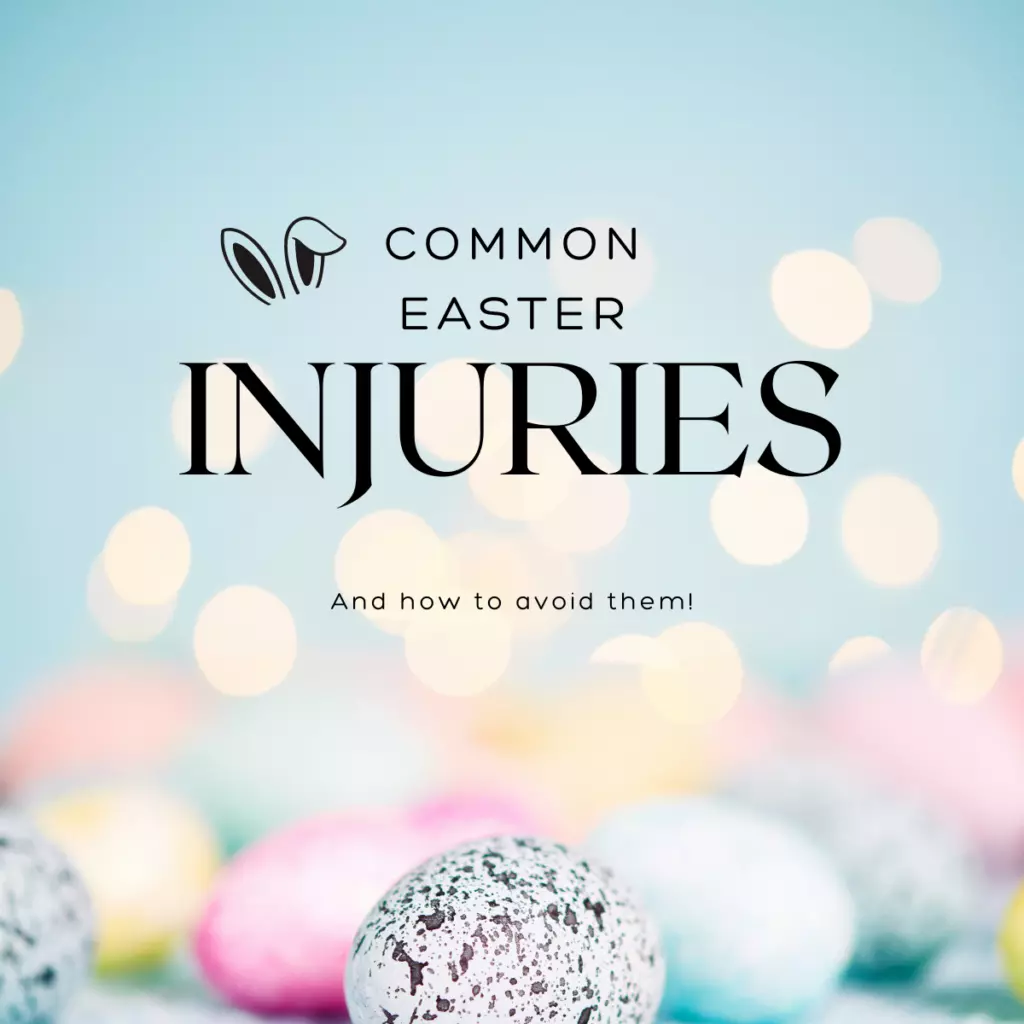Easter is a time of celebration, family gatherings, and fun traditions. However, it’s also a time when accidents and injuries can occur.
In this article, we will discuss five common Easter injuries and provide helpful tips on how to avoid them. By being aware of these potential hazards and taking the necessary precautions, you can ensure a safe and enjoyable holiday for everyone.

1. Burn Injuries
Easter often involves cooking large meals and participating in activities that can cause burn injuries. These injuries can occur in a variety of ways, from hot surfaces in the kitchen to Easter egg dye mishaps.
a. Cooking-related burns
With many people preparing meals during Easter gatherings, the risk of burns from hot stovetops, ovens, and other cooking appliances increases.
How to avoid cooking-related burns:
- Always use oven mitts when handling hot cookware.
- Keep pot handles turned toward the back of the stove to prevent accidental spills.
- Teach children about the dangers of hot surfaces and keep them away from the kitchen while cooking.
- Avoid wearing loose-fitting clothing that could catch fire near open flames.
b. Easter egg dye burns
Easter egg dye can cause burns if it’s too hot or comes into contact with skin. Children are particularly at risk for these injuries.
How to avoid Easter egg dye burns:
- Follow the instructions on the dye package carefully, ensuring the dye solution is at the correct temperature.
- Use non-toxic dyes specifically designed for Easter egg coloring.
- Always supervise children during egg dyeing activities.
- Use gloves to protect your hands while dyeing eggs.
2. Choking Hazards
Small toys, candy, and other Easter treats can pose choking hazards, particularly for young children.
a. Small toys and trinkets
Easter baskets and egg hunts often include small toys that can be easily swallowed by young children.
How to avoid choking hazards from small toys:
- Choose age-appropriate toys and gifts for children, following the manufacturer’s guidelines.
- Keep small toys and trinkets away from children under the age of three.
- Supervise children during Easter egg hunts and other activities involving small items.
b. Candy and food
Easter is a time for indulging in sweet treats, but certain types of candy can be a choking hazard for young children.
How to avoid choking hazards from candy and food:
- Avoid giving hard candies, jelly beans, and other small candies to children under the age of four.
- Cut larger pieces of food into smaller, manageable bites for young children.
- Supervise children while they eat, and encourage them to chew their food thoroughly.
3. Slip and Fall Accidents
Easter celebrations can also lead to slip and fall accidents, both indoors and outdoors.
a. Indoor slip and fall accidents
With many people gathering for Easter festivities, spills and clutter can create slip and fall hazards inside the home.
How to avoid indoor slip and fall accidents:
- Keep walkways and common areas clear of clutter and obstacles.
- Clean up spills immediately to prevent slippery surfaces.
- Use non-slip mats or rugs in high-traffic areas.
- Ensure proper lighting in all areas of the home.
b. Outdoor slip and fall accidents
Easter egg hunts and other outdoor activities can expose participants to slip and fall hazards.
How to avoid outdoor slip and fall accidents:
- Choose a well-lit, level area for outdoor Easter activities.
- Clear the area of any debris, such as rocks or sticks, before beginning the activity.
- Encourage participants to wear appropriate footwear for outdoor activities.
- Monitor weather conditions and reschedule outdoor events if necessary
4. Car Accidents
Easter weekend often sees an increase in car accidents due to increased travel and impaired driving.
a. Increased travel
With many people visiting family and friends for Easter celebrations, the roads can become congested, increasing the risk of car accidents.
How to avoid car accidents during increased travel:
- Plan your route ahead of time and allow for extra travel time in case of traffic.
- Ensure your vehicle is well-maintained and in good working order before embarking on a long journey.
- Stay alert and focused on the road, taking regular breaks if needed.
- Follow traffic laws, including speed limits and signaling.
b. Impaired driving
Easter gatherings may involve alcohol consumption, which can lead to impaired driving and an increased risk of car accidents.
How to avoid impaired driving-related car accidents:
- Always designate a sober driver or arrange for alternative transportation, such as a taxi or rideshare service.
- Be aware of your alcohol consumption and know your limits.
- If you’re hosting an Easter gathering, offer non-alcoholic drink options and encourage guests to make responsible choices.
- Report any suspected drunk drivers to the authorities.
5. Unsafe Products
Easter can also bring about accidents related to unsafe products, such as toys, decorations, and even food items.
a. Toys and decorations
Poorly made or age-inappropriate toys and decorations can pose hazards, including choking, strangulation, and injury.
How to avoid accidents related to unsafe toys and decorations:
- Purchase toys and decorations from reputable sources and check for any recalls or safety warnings.
- Follow age guidelines on products and choose age-appropriate items for children.
- Inspect toys and decorations for any small, loose, or broken parts that could pose a hazard.
- Supervise children when they are playing with new toys or interacting with decorations.
b. Foodborne illnesses
Improperly prepared or stored food items can lead to foodborne illnesses during Easter gatherings.
How to avoid foodborne illnesses:
- Practice proper food handling and preparation techniques, including washing your hands and surfaces often.
- Cook meats to their recommended internal temperatures and refrigerate perishable items promptly.
- Avoid cross-contamination by keeping raw and cooked foods separate.
- Be mindful of food allergies and intolerances when preparing meals for guests.
By being aware of these common Easter injuries and taking the necessary precautions, you can create a safe and enjoyable holiday environment for yourself and your loved ones.
Remember to stay vigilant, follow safety guidelines, and enjoy the festivities responsibly. Happy Easter from GJEL Accident Attorneys.



 AI-search
AI-search  Email
Email